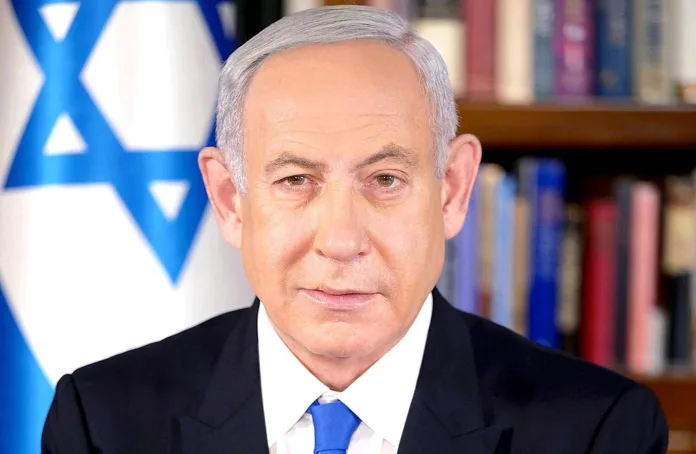Israeli Prime Minister’s U.S. Visit includes high-level talks with Biden, Harris, and Trump, focusing on hostage crisis and Hamas conflict
Israeli Prime Minister Benjamin Netanyahu is set for a series of crucial meetings in Washington this week. On Thursday, he will sit down with U.S. President Joe Biden at the White House, marking their first encounter since Biden’s visit to Israel following the October 7 Hamas attack. Scheduled for 1 p.m. local time (8 p.m. Israel time), this meeting will also include a session with the families of American hostages currently held by Hamas.
The initial plan was to meet Biden on Tuesday, but Biden’s return from quarantine in Delaware due to COVID-19 caused a delay. Following his discussion with Biden, Netanyahu will also meet Vice President Kamala Harris. Harris, who is set to be the Democratic presidential nominee, is expected to use the meeting to advocate for a resolution that ensures Israel’s security while addressing Palestinian suffering.
Embed from Getty ImagesAfter these meetings, Netanyahu will travel to Florida for a Friday session with former President Donald Trump at his Mar-a-Lago resort. The timing of this meeting has shifted due to confusion over scheduling. Trump had initially posted varying dates on social media before confirming the Friday arrangement. This meeting, closed to the press, will take place despite criticisms regarding its timing, which coincides with Netanyahu’s son’s birthday.
Netanyahu’s U.S. trip will extend into the weekend, requiring him to remain in the U.S. until after Shabbat concludes. He will spend the majority of his time in Washington but will briefly visit Florida for the Trump meeting.
The Israeli Prime Minister has had complex relationships with both Biden and Trump. During Trump’s presidency, Netanyahu enjoyed strong support, including key policy achievements like the Abraham Accords and the relocation of the U.S. embassy to Jerusalem. However, Trump’s post-presidency criticism of Netanyahu has been sharp, particularly regarding the handling of the October 7 Hamas attack and Netanyahu’s congratulatory message to Biden in 2020.
Biden, a long-time supporter of Israel, has had a more contentious relationship with Netanyahu, marked by disagreements over humanitarian aid, civilian casualties, and policies in Gaza. Their relationship has seen strains, especially with Biden’s actions during Israel’s operations in Gaza and his administration’s stance on humanitarian concerns.
In addition to these high-level meetings, Netanyahu will deliver a speech to a joint session of Congress. His address will highlight Israel’s determination to achieve “total victory” over Hamas, outline efforts to free hostages, and address Iran’s influence in the region. Netanyahu will also meet with Congressional leaders from both parties before his speech, aiming to reinforce Israel’s strong alliance with the U.S.
Throughout his visit, Netanyahu is expected to emphasize Israel’s ongoing challenges and the strategic importance of U.S. support. His discussions with Biden, Harris, and Trump underscore the critical nature of U.S.-Israel relations and the broader geopolitical implications of their interactions.
Analysis:
Political: Netanyahu’s meetings with Biden, Harris, and Trump highlight the intricate nature of U.S.-Israel relations and the balancing act required to maintain bipartisan support in Washington. The meetings reflect Israel’s strategic approach to leverage support from both Democratic and Republican leaders while navigating complex international issues, including the ongoing conflict with Hamas and regional threats from Iran.
Social: The timing and content of Netanyahu’s visit reveal the social and political pressures faced by leaders in addressing international crises. The focus on hostages and conflict resolution resonates with broader societal concerns about security and humanitarian issues. The visit also underscores the influence of personal relationships and political dynamics on international diplomacy.
Racial: Although not directly addressed, the visit touches on racial and ethnic dynamics through the broader context of the Israeli-Palestinian conflict and the impact of U.S. foreign policy on these issues. The interactions between Netanyahu and U.S. leaders also reflect ongoing debates about the role of race and ethnicity in international relations and policy decisions.
Gender: The involvement of Vice President Kamala Harris in the discussions brings gender dynamics into the spotlight. Harris’s role as a leading Democratic candidate and her focus on humanitarian issues highlight the intersection of gender and policy in addressing global conflicts and human rights concerns.
Economic: The meetings and discussions are likely to influence economic considerations, including U.S. aid to Israel, trade relations, and the broader economic implications of Middle Eastern stability. Netanyahu’s visit underscores the economic dimensions of international diplomacy and the impact of political decisions on global markets and economic stability.
